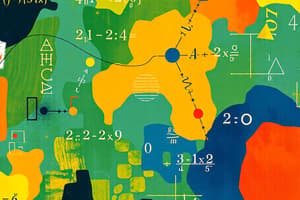Podcast
Questions and Answers
Which of the following best describes the role of variables in algebra?
Which of the following best describes the role of variables in algebra?
- They represent fixed numerical values.
- They indicate the relationship between known values.
- They are symbols that represent unknown values or quantities. (correct)
- They are symbols used to perform mathematical operations.
What is the result of isolating the variable in the equation 3x + 5 = 20?
What is the result of isolating the variable in the equation 3x + 5 = 20?
- x = 8
- x = 7 (correct)
- x = 5
- x = 3
In the slope-intercept form of a linear equation, what does 'b' represent?
In the slope-intercept form of a linear equation, what does 'b' represent?
- The total distance of the line
- The y-intercept (correct)
- The x-intercept
- The slope of the line
When graphing the linear equation y = 2x + 3, what is the slope of the line?
When graphing the linear equation y = 2x + 3, what is the slope of the line?
Which operation is performed first when using the distributive property for 3(x + 4)?
Which operation is performed first when using the distributive property for 3(x + 4)?
What is the significant difference between solving equations and inequalities?
What is the significant difference between solving equations and inequalities?
What does it mean when two lines intersect on a graph concerning systems of equations?
What does it mean when two lines intersect on a graph concerning systems of equations?
What is the combined result of 2x + 3x - 5 + 4?
What is the combined result of 2x + 3x - 5 + 4?
Which of the following statements is true regarding polynomials?
Which of the following statements is true regarding polynomials?
In the context of algebra, what is the definition of an equation?
In the context of algebra, what is the definition of an equation?
Flashcards
Algebra
Algebra
A branch of mathematics that uses letters and symbols to represent unknown values and variables. It allows for the generalization of arithmetic principles. It provides a framework for solving equations and inequalities. It plays a crucial role in modeling real-world phenomena and relationships. Often involves manipulating expressions and equations to find solutions.
Variables
Variables
Symbols (usually letters) used to represent unknown values.
Constants
Constants
Fixed numerical values that don't change.
Expressions
Expressions
Signup and view all the flashcards
Equations
Equations
Signup and view all the flashcards
Inequalities
Inequalities
Signup and view all the flashcards
Solving equations
Solving equations
Signup and view all the flashcards
Solving inequalities
Solving inequalities
Signup and view all the flashcards
Factoring
Factoring
Signup and view all the flashcards
Linear equation graph
Linear equation graph
Signup and view all the flashcards
Study Notes
Introduction to Algebra
- Algebra is a branch of mathematics that uses letters and symbols to represent unknown values and variables.
- It generalizes arithmetic principles.
- It provides a framework for solving equations and inequalities.
- It models real-world phenomena and relationships.
- It often involves manipulating expressions and equations to find solutions.
Key Concepts in Algebra
- Variables: Symbols (usually letters) representing unknown values.
- Constants: Fixed numerical values.
- Expressions: Combinations of variables and constants through mathematical operations.
- Equations: Statements showing the equality of two expressions (e.g., x + 2 = 5).
- Inequalities: Statements showing the relationship between two expressions using inequality symbols (e.g., x > 3).
Solving Equations and Inequalities
- Equations are solved by isolating the variable on one side.
- Rules of equality (e.g., adding the same value to both sides) are essential.
- Inequalities are solved similarly but the inequality symbol might change direction when applying certain operations.
Operations on Algebraic Expressions
- Combining like terms: Adding or subtracting terms with identical variables and exponents.
- Distributive property: Multiplying a term by an expression within parentheses.
- Factoring: Finding common factors of terms in an expression.
- Polynomial operations: Performing addition, subtraction, multiplication, and division on polynomials.
Graphing Linear Equations
- A linear equation represents a straight line on a coordinate plane.
- The slope-intercept form (y = mx + b) is common, where 'm' is the slope and 'b' is the y-intercept.
- The slope indicates the line's steepness and direction.
- The y-intercept is where the line crosses the y-axis.
- Graphing involves plotting points and connecting them to form the line. Points are found by substitution.
- Finding intercepts: A method for graphing lines involves using the x- and y-intercepts.
Graphing Systems of Equations
- Systems of equations comprise two or more equations.
- Solutions to systems are points satisfying all equations.
- Graphical solutions involve plotting the lines and finding their intersection.
- Algebraic solutions include methods like substitution or elimination.
Relationship Between Algebra and Graphs
- Graphs visually represent algebraic relationships.
- Coordinates on a graph correspond to solutions of equations or inequalities.
- Visualizing equations and relationships on graphs aids understanding and problem-solving.
- Understanding relationships between equations and their characteristics allows prediction of outcomes.
Studying That Suits You
Use AI to generate personalized quizzes and flashcards to suit your learning preferences.




